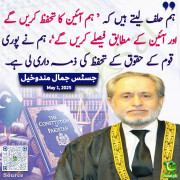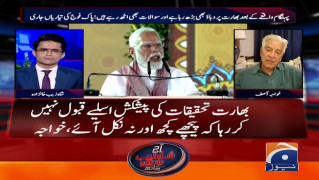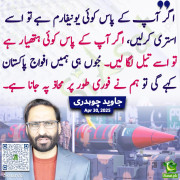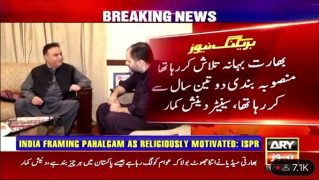Afridi Coach
Politcal Worker (100+ posts)
My favourite writer has provided detailed explanation of mohajir word and identity about why Karachi people support MQM even they are in extortion and target killing.
Even Dr Arif Alvi appreciated him on twitter for excellent analysis. Everybody must read and try to understand - it is not meaning of word mohajir like refugee or migrant but what it means to those people who are using this word. Like overseas Pakistanis childrens and grandchildrens are still thinking and saying they are pakistani even they are born in UK OR USA. Very interesting to read.
What Karachi Wants

Thanks to another ill-advised rant by Altaf Hussain a couple of nights ago, invoking India, NATO, and only he knows who else, to come to his partys aid, Karachi is, yet again, the center of the political and security debate. The Karachi issue, if it can even be described as such a singularity, is extremely complex and the layers of ethnic identity, organized crime, political rivalries, civil-military balance, and terrorism are piled upon genuine issues and grievances.
That Altaf Hussain has exploited them for three decades does not make these issues any less real or important.I was born in Karachi, to parents who migrated from India after partition, and lived there for most of my life. I consider Urdu to be my mother tongue, with a smattering of Kutchi and Gujrati thrown in. As a young boy in my early teens I saw the rise of MQM, from the public rally in Nishtar Park in 1986 to the 1987 local bodies elections and the 1988 general elections.
I saw families with brooms in the streets during cleanliness drives, women and children saving up to donate what little they could, and hundreds of clay oil lamps light up the city in celebration of election victories. But I am not an MQM supporter. Not anymore.Not since the party transformed into an organized crime mafia in the early nineties. When political muscle in the form of guns and groups of fighters to combat religious parties mutated into enforced donations and strikes, street crime, armed robbery, gunfights for control of territory, torture cells, dead bodies in jute sacks, kidnap for ransom, and all kinds of other criminal activity. When a militant hardcore began operating above the law, with the power to shut down the entire city in thirty minutes, which could dictate media coverage and hold governments hostage.
And I was not alone. There were many thousands of others like me who withdrew their support and were happy to see operation clean-up, codenamed Operation Blue Fox, begin in 1992, that we hoped would establish the writ of state on the city. But what ensued was the bloodiest period in Karachis history. Over four years, hundreds, perhaps thousands were killed or taken into custody, never to be seen again.
Illegal incarceration, torture, extra-judicial murder, allegations of treason, the Jinnahpur conspiracy theory, and blatant disregard for the law, the constitution and fundamental rights meant that all the operation was successful in doing was strengthen the beliefs that MQM had been exploiting all along: that mohajirs were looked down upon, discriminated against, and even hated by the predominantly Punjabi and Sindhi seats of power. That the war MQM was fighting was for the rights of the people of Karachi against a racist elite who never accepted as Pakistanis the very migrants who sacrificed the most for bringing the country into existence. As a result, MQM came back stronger and, in the 1997 general elections, was the third largest political force in the country.
And history is repeating itself.I was watching Kamran Shahids show yesterday, which served to reinforce several things for me. Knowing that anything you watch on TV is most likely scripted in advance, and that what ends up on air as maybe fifteen minutes of interviews with people on the streets is probably edited from several hours of footage, his conversations with people in the surrounding areas of the MQM headquarters at Nine-Zero did demonstrate the sentiment in those quarters. People clearly believe that they are being persecuted and deliberately targeted by security forces due to an ethnic bias against mohajirs.

This belief is reinforced by the same heavy-handed disrespect for the law by members of the security forces whose job it is to enforce it. It is the same as the nineties: midnight raids, breaking into peoples homes, violence and abusive behavior, illegal detention, torture, disappearance and extra-judicial killing. Add to that revelations about connections with RAW and video confessions surfacing out of nowhere and you have people convinced that they are being targeted yet again.Search warrants? Investigation? Magistrate? Remand? Charges? Prosecution? Trial? Conviction? None of the above.
You can argue with this and disagree with it all you want. The fact is, MQM supporters believe the operation is designed to eliminate the party to disenfranchise mohajirs and deprive them of representation so their rights can be denied with impunity.What makes things worse is when you start insulting Altaf Hussain and denying the mohajir identity.
Regardless of what you and I think about him and how evil we might believe him to be, Altaf Hussain is seen by many as a revered and beloved leader, someone who has championed the cause of a downtrodden people, who has forced the mohajir voice to be heard in mainstream discourse. Of course, Altaf Hussain does himself no favors when he goes off on one of his uncontrolled tirades, some say deliberately designed to provoke, but when people like Khwaja Asif, who themselves have questionable credentials, become defenders of the security forces, it is hardly surprising that MQM supporters feel insulted and hurt.Here are some of the things the defense minister has
been
saying today
And this is some of the milder rhetoric. It is almost as if they want to be deliberately offensive to provoke even more reaction, insult and attack the dignity of MQM supporters, and demonstrate their superiority by ridiculing political opponents. And then you expect them to believe that you love them?On top of this, most Pakistanis dont understand the significance of the mohajir identity.
People get hung up on the literal meaning of the word and fail to see past the argument of how can you still be a migrant or a refugee after sixty eight years, when most of you were even born here? to understand that when children of migrants from India call themselves mohajirs, they dont mean refugees. They are using the term to identify themselves with others of a similar background, history, and culture to evoke a sense of belonging.
Its just a word.Human beings are deeply driven by a sense of belonging, of identity, of who we are. Being a part of a group is central to the hierarchy of needs defined by Maslow in his paper A Theory of Human Motivation and this is what made MQM attractive to mohajirs. It offered them an identity in a country where Sindhis, Punjabis, Pushtoons and Balochs saw them as strangers who did not know where they belonged.The argument that people from Eastern Punjab or Kashmir who migrated at partition are also mohajirs or that you cannot be a mohajir any more since you were born in Pakistan is subconsciously perceived by mohajirs as an attempt to rob them of their identity. Without even thinking about it, they instinctively react to that.
It causes anxiety and stress, which triggers a defense mechanism. And once the amygdala kicks in, rational thought goes out the window.Why do you even need an identity beyond that of being a Pakistani, some will ask. And the answer is you just do. It is how human beings are. As we get into smaller groups, we need to identify with and belong to some members of that group, a narrower identity. In Pakistan, I want to be a Punjabi, for example. In Punjab, I want to be a Kashmiri or an Arain. As an Arain, I want to be Chaudhry,
Shami, Chachar, or Sayal.

When I was in England in the early nineties, I saw this need manifest in two ways. I saw how took British Pakistanis in my college identified themselves as Asians and took pride in their culture and heritage. At an Asian Society event, the need was to be Pakistani or Indian or Bangladeshi. In a group of Pakistanis, it was narrower: Punjabi or Pathan. I never knew how to introduce myself then. I quickly found mohajir was not accepted and words like hindustani or bhaiyya often followed. So I took to using Karachiite, which still works for me, to a degree.
The other phenomenon I saw was young British men and women born in England to Pakistani parents at an England versus Pakistan cricket match at Edgbaston, carrying Pakistani flags, wearing the green replica shirts of the Pakistan cricket team and cheering for the country of their parents against their own. And I saw the anger and resentment,
the emotional response, when their British friends asked them why they did that when they were British, which I thought at the time was a very reasonable question. But for them it was offensive and the people asking the question were quickly labeled racist.Thats the mix you have: (a) a perception of injustice, discrimination and oppression; (b) a narrative of insult and ridicule; and (c) a denial of identity. Can you really blame them when people feel they have no option but to look to a force, despite your knowledge of their involvement in crime and militancy, that stands with you to fight for your rights? And remember that people arent always thinking this through.
It is almost instinctive. They are just going with their gut, their basic instinct. And if you cannot empathize with that, continue to mock them, and deny their identity, there is no way to gain their political support. Look at what happened to PTI in the NA-246 by-election.As the cameras rolled in Kamran Shahids show and he moved on to other areas of Karachi, the response changed. Most traders, business owners, and folks living in more diverse communities within Karachi seemed satisfied with the Rangers operation. They are happy with the improved security situation and reduction in crime.امن آ گیاThey dont mean peace, they mean security. I feel safe now, is what they are really saying.
It hit me that we were now a rung lower in Maslows hierarchy of needs. Safety is an even more important basic human need than identity and the people of Karachi have been deprived of it for so long, they crave it more than anything else. To hell with democracy and MQM and PTI and corruption and the economy! Yes, Rangers must stay! We want the operation to continue! they were saying, Just give us security.And then they added, Oh, and water! Please give us water! And electricity!We had reached the lowest rung, I realized. These good people of Karachi were now telling us that even their physical needs of water, sanitation and shelter are not being met. Thats how bad things are.
And that is what Karachi wants. Just that the most basic of their basic human needs be fulfilled: physiological needs, safety and belonging.It isnt asking for much, is it?
https://redwishdotcom.wordpress.com/2015/08/05/what-karachi-wants/
Even Dr Arif Alvi appreciated him on twitter for excellent analysis. Everybody must read and try to understand - it is not meaning of word mohajir like refugee or migrant but what it means to those people who are using this word. Like overseas Pakistanis childrens and grandchildrens are still thinking and saying they are pakistani even they are born in UK OR USA. Very interesting to read.
What Karachi Wants

Thanks to another ill-advised rant by Altaf Hussain a couple of nights ago, invoking India, NATO, and only he knows who else, to come to his partys aid, Karachi is, yet again, the center of the political and security debate. The Karachi issue, if it can even be described as such a singularity, is extremely complex and the layers of ethnic identity, organized crime, political rivalries, civil-military balance, and terrorism are piled upon genuine issues and grievances.
That Altaf Hussain has exploited them for three decades does not make these issues any less real or important.I was born in Karachi, to parents who migrated from India after partition, and lived there for most of my life. I consider Urdu to be my mother tongue, with a smattering of Kutchi and Gujrati thrown in. As a young boy in my early teens I saw the rise of MQM, from the public rally in Nishtar Park in 1986 to the 1987 local bodies elections and the 1988 general elections.
I saw families with brooms in the streets during cleanliness drives, women and children saving up to donate what little they could, and hundreds of clay oil lamps light up the city in celebration of election victories. But I am not an MQM supporter. Not anymore.Not since the party transformed into an organized crime mafia in the early nineties. When political muscle in the form of guns and groups of fighters to combat religious parties mutated into enforced donations and strikes, street crime, armed robbery, gunfights for control of territory, torture cells, dead bodies in jute sacks, kidnap for ransom, and all kinds of other criminal activity. When a militant hardcore began operating above the law, with the power to shut down the entire city in thirty minutes, which could dictate media coverage and hold governments hostage.
And I was not alone. There were many thousands of others like me who withdrew their support and were happy to see operation clean-up, codenamed Operation Blue Fox, begin in 1992, that we hoped would establish the writ of state on the city. But what ensued was the bloodiest period in Karachis history. Over four years, hundreds, perhaps thousands were killed or taken into custody, never to be seen again.
Illegal incarceration, torture, extra-judicial murder, allegations of treason, the Jinnahpur conspiracy theory, and blatant disregard for the law, the constitution and fundamental rights meant that all the operation was successful in doing was strengthen the beliefs that MQM had been exploiting all along: that mohajirs were looked down upon, discriminated against, and even hated by the predominantly Punjabi and Sindhi seats of power. That the war MQM was fighting was for the rights of the people of Karachi against a racist elite who never accepted as Pakistanis the very migrants who sacrificed the most for bringing the country into existence. As a result, MQM came back stronger and, in the 1997 general elections, was the third largest political force in the country.
And history is repeating itself.I was watching Kamran Shahids show yesterday, which served to reinforce several things for me. Knowing that anything you watch on TV is most likely scripted in advance, and that what ends up on air as maybe fifteen minutes of interviews with people on the streets is probably edited from several hours of footage, his conversations with people in the surrounding areas of the MQM headquarters at Nine-Zero did demonstrate the sentiment in those quarters. People clearly believe that they are being persecuted and deliberately targeted by security forces due to an ethnic bias against mohajirs.

This belief is reinforced by the same heavy-handed disrespect for the law by members of the security forces whose job it is to enforce it. It is the same as the nineties: midnight raids, breaking into peoples homes, violence and abusive behavior, illegal detention, torture, disappearance and extra-judicial killing. Add to that revelations about connections with RAW and video confessions surfacing out of nowhere and you have people convinced that they are being targeted yet again.Search warrants? Investigation? Magistrate? Remand? Charges? Prosecution? Trial? Conviction? None of the above.
You can argue with this and disagree with it all you want. The fact is, MQM supporters believe the operation is designed to eliminate the party to disenfranchise mohajirs and deprive them of representation so their rights can be denied with impunity.What makes things worse is when you start insulting Altaf Hussain and denying the mohajir identity.
Regardless of what you and I think about him and how evil we might believe him to be, Altaf Hussain is seen by many as a revered and beloved leader, someone who has championed the cause of a downtrodden people, who has forced the mohajir voice to be heard in mainstream discourse. Of course, Altaf Hussain does himself no favors when he goes off on one of his uncontrolled tirades, some say deliberately designed to provoke, but when people like Khwaja Asif, who themselves have questionable credentials, become defenders of the security forces, it is hardly surprising that MQM supporters feel insulted and hurt.Here are some of the things the defense minister has
been
saying today
:ان کی دم پر پاؤں آیا ہے تو یہ لندن میں بیٹھ کے چیخنے چللانے لگ پڑے ہیںیہاں پی آکے بات کرے. وہاں پی بیٹھ کے سیکورٹی اداروں کو اور فوج کو گالیاں دیتا ہے اور انڈیا کے اپن آقاؤں کو وہاں سے آوازیں دیتا ہےاوقات ان کی سب کو پتا ہے. یہ ساری گمکری ہے. یہ بنارسی ٹھگ جس قسم کی باتیں کرتے ہیں یہ آپکو سمجھنی چاہییں
And this is some of the milder rhetoric. It is almost as if they want to be deliberately offensive to provoke even more reaction, insult and attack the dignity of MQM supporters, and demonstrate their superiority by ridiculing political opponents. And then you expect them to believe that you love them?On top of this, most Pakistanis dont understand the significance of the mohajir identity.
People get hung up on the literal meaning of the word and fail to see past the argument of how can you still be a migrant or a refugee after sixty eight years, when most of you were even born here? to understand that when children of migrants from India call themselves mohajirs, they dont mean refugees. They are using the term to identify themselves with others of a similar background, history, and culture to evoke a sense of belonging.
Its just a word.Human beings are deeply driven by a sense of belonging, of identity, of who we are. Being a part of a group is central to the hierarchy of needs defined by Maslow in his paper A Theory of Human Motivation and this is what made MQM attractive to mohajirs. It offered them an identity in a country where Sindhis, Punjabis, Pushtoons and Balochs saw them as strangers who did not know where they belonged.The argument that people from Eastern Punjab or Kashmir who migrated at partition are also mohajirs or that you cannot be a mohajir any more since you were born in Pakistan is subconsciously perceived by mohajirs as an attempt to rob them of their identity. Without even thinking about it, they instinctively react to that.
It causes anxiety and stress, which triggers a defense mechanism. And once the amygdala kicks in, rational thought goes out the window.Why do you even need an identity beyond that of being a Pakistani, some will ask. And the answer is you just do. It is how human beings are. As we get into smaller groups, we need to identify with and belong to some members of that group, a narrower identity. In Pakistan, I want to be a Punjabi, for example. In Punjab, I want to be a Kashmiri or an Arain. As an Arain, I want to be Chaudhry,
Shami, Chachar, or Sayal.

When I was in England in the early nineties, I saw this need manifest in two ways. I saw how took British Pakistanis in my college identified themselves as Asians and took pride in their culture and heritage. At an Asian Society event, the need was to be Pakistani or Indian or Bangladeshi. In a group of Pakistanis, it was narrower: Punjabi or Pathan. I never knew how to introduce myself then. I quickly found mohajir was not accepted and words like hindustani or bhaiyya often followed. So I took to using Karachiite, which still works for me, to a degree.
The other phenomenon I saw was young British men and women born in England to Pakistani parents at an England versus Pakistan cricket match at Edgbaston, carrying Pakistani flags, wearing the green replica shirts of the Pakistan cricket team and cheering for the country of their parents against their own. And I saw the anger and resentment,
the emotional response, when their British friends asked them why they did that when they were British, which I thought at the time was a very reasonable question. But for them it was offensive and the people asking the question were quickly labeled racist.Thats the mix you have: (a) a perception of injustice, discrimination and oppression; (b) a narrative of insult and ridicule; and (c) a denial of identity. Can you really blame them when people feel they have no option but to look to a force, despite your knowledge of their involvement in crime and militancy, that stands with you to fight for your rights? And remember that people arent always thinking this through.
It is almost instinctive. They are just going with their gut, their basic instinct. And if you cannot empathize with that, continue to mock them, and deny their identity, there is no way to gain their political support. Look at what happened to PTI in the NA-246 by-election.As the cameras rolled in Kamran Shahids show and he moved on to other areas of Karachi, the response changed. Most traders, business owners, and folks living in more diverse communities within Karachi seemed satisfied with the Rangers operation. They are happy with the improved security situation and reduction in crime.امن آ گیاThey dont mean peace, they mean security. I feel safe now, is what they are really saying.
It hit me that we were now a rung lower in Maslows hierarchy of needs. Safety is an even more important basic human need than identity and the people of Karachi have been deprived of it for so long, they crave it more than anything else. To hell with democracy and MQM and PTI and corruption and the economy! Yes, Rangers must stay! We want the operation to continue! they were saying, Just give us security.And then they added, Oh, and water! Please give us water! And electricity!We had reached the lowest rung, I realized. These good people of Karachi were now telling us that even their physical needs of water, sanitation and shelter are not being met. Thats how bad things are.
And that is what Karachi wants. Just that the most basic of their basic human needs be fulfilled: physiological needs, safety and belonging.It isnt asking for much, is it?
https://redwishdotcom.wordpress.com/2015/08/05/what-karachi-wants/
Last edited by a moderator:




























